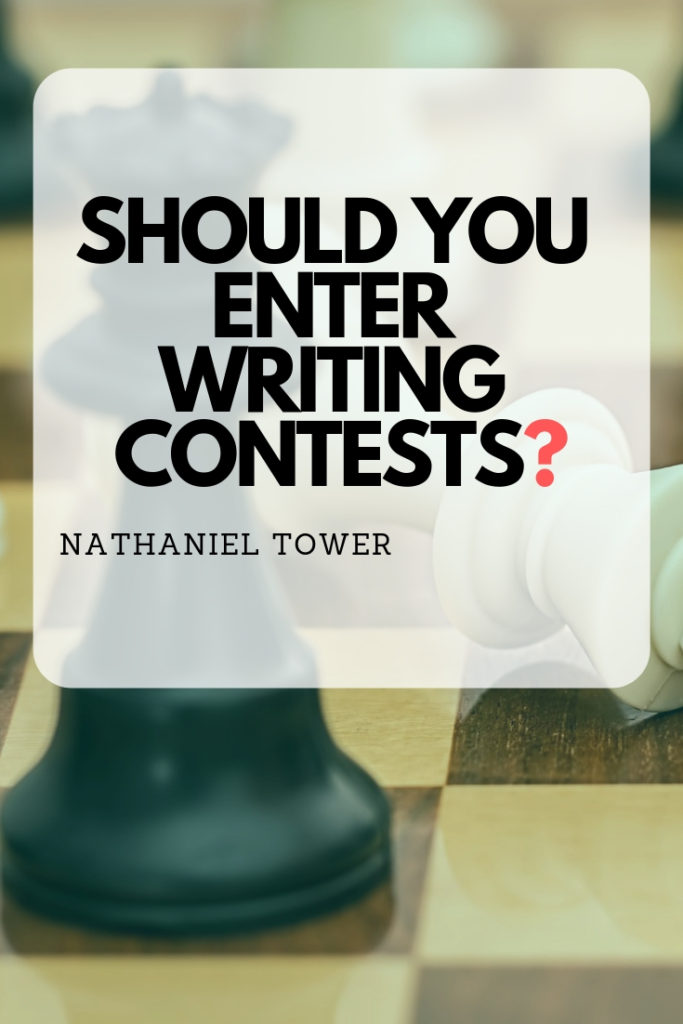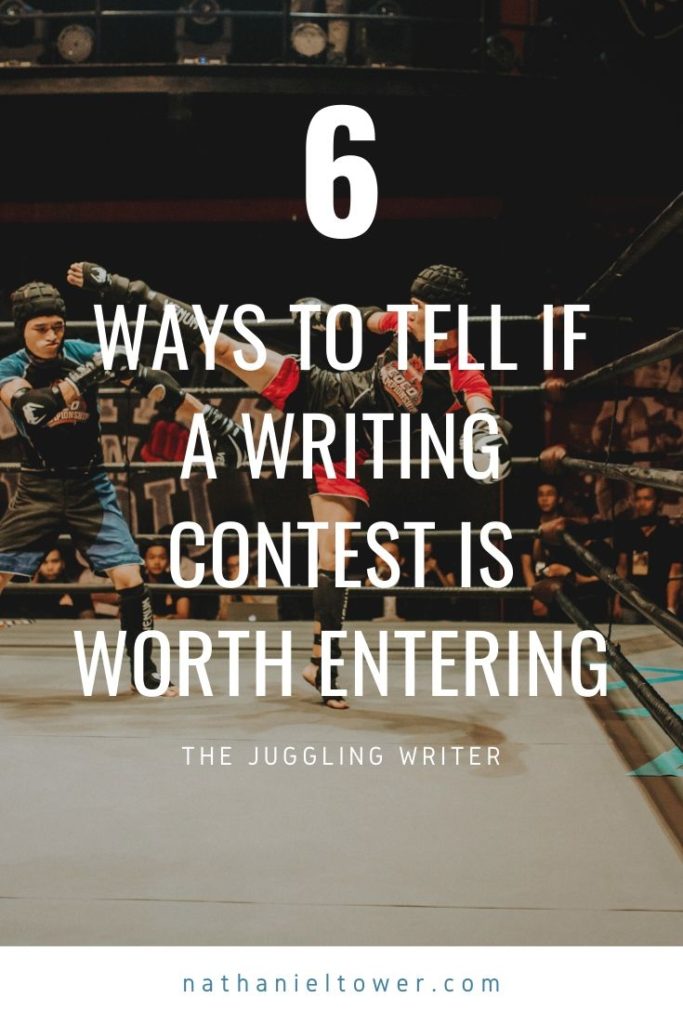Last Updated on April 5, 2020 by Nathaniel Tower
Thus far in my writing career, I have been the lucky victor of four writing contests, earning a grand total of $155 ($50 of which was in Amazon gift cards, one of which was never delivered). None of these were fee-based contests. I haven’t entered a lot of fee-based contests, but I know I’m 0 for something. Of course, I’ve also lost my fair share of free contests. If there’s one thing I’ve noticed about writing contests, they’re a lot easier to lose than they are to win.
That being said, are writing contests even worth entering?
The benefits of writing contests
Writing contests can be a great way to push your writing. A contest prompt might challenge you to write in a new way, and the whole experience may give you a better appreciation for the editing process. After all, you aren’t likely to send away an unpolished manuscript when you’re paying a $5, $10, or even $25 entry fee. No sense in just throwing money away on poorly written gibberish, right?
As an editor, I have managed and judged four paying contests now (and been the guest judge for a couple others). In terms of what judges are looking for in a contest, it’s impossible to say much more than “the winner is the most effectively told story,” or something of that sort. In other words, we’ll know it when we see it.
Should you enter a writing contest?

The other day, a friend posited this question: are contests even worth entering?
I guess the short answer is: if you think you can win, sure. (Check out this post for tips on how to win a writing contest.)
This, of course, is the very short answer. And I don’t think it’s a terribly accurate one either.
There are many reasons that make a writing contest worth entering outside of winning. There’s the challenge, the process, the competition, the fact that you are supporting some part of the writing community, etc. Writing contests force writers to push themselves, just like any athletic competition would. Is it worth it to enter a road race if you can’t win? Okay, maybe this analogy is a little far-fetched, but if you really think about it, there are similar gains.
Which contests should you enter?
The big question then becomes how do I know which contests to enter?
Luckily, there are dozens of listings of writing contests, and there are dozens of resources that talk about writing contests. Sites like Preditors and Editors can tell you if a writing contest is a scam or untrustworthy. Some things that can suggest a scam: incomplete guidelines, requests for lots of personal information, guarantees that everyone will be published, no information regarding judges or the judging process. The best way of spotting a scam is prior bad reviews of the contest. That and the old adage of trust your gut. If things don’t seem right, stay away.
When entering contests, don’t overdo it. Let’s go back to the road racing analogy. You aren’t going to run a marathon every week (at least not within any success, and the long-term effects on your body surely won’t be positive). Don’t enter every contest you find, whether it’s free or fee. It’s just not healthy for your writing. You’ll find that you’re churning out dozens of junk manuscripts. Focus on putting together some quality pieces and picking a few contests to enter. You’re not going to make a living off of writing contests.
What to do after you’ve picked a contest to enter
After you’ve selected a contest that seems worth entering, there are two avenues you can take. The first is to start working on your entry. The second, and probably better option for the sake of the contest, is to look at past winners. Try to get a good sense of what the judges are looking for. Of course, you should never copy or emulate a previous winner, but if every past winner writes some crazy post-beatnik experimentalist minimalist prose and you are a rather straightforward and traditional writer, you may want to consider sitting this contest out. You also probably don’t want to write about the same thing that the last winner wrote about. And definitely don’t try to do a sequel or a spinoff. The judges won’t be impressed just because you read their last winner.
In the process of studying the past winners, also take some time to learn about the judges. Are the judges the same as past years? Is there a well-known guest judge? Is there a Q&A with the judge providing more information about what he/she is looking for? If you can, find some of the previous work of the judges and read that as well.
If this is the first year a contest is running, or if the previous winners are only available in paid issues that you don’t want to pay for, find other samples of writing that the publication produces. Almost every magazine provides at least some free content for readers. Read what they’ve published. If you can’t find anything that they’ve published, then stay away. Seems like they have too much to hide.
You’re probably thinking that all this reading is going to take away from your writing, but it can only help. As it’s been said many times before, the best way to become a better writer is by reading.
After you’ve thoroughly studied the contest and the publication, continue working on your own story. Remember to follow the prompt and any guidelines. Remember that a lot of people will probably enter the contest, so you want to do something a little unique, but you don’t want to break the rules. Give the judges something that no one else will, or at least something that not everyone else did.
Follow your typical drafting, editing, and revising stages, but be a little more thorough. Unlike regular publications, contests aren’t going to ask you for a rewrite or make some suggestions before they pick the winner. It’s always a good idea to share your entry with a few other writers (and even non-writers) and ask for their feedback. If you’re part of any writer groups, share information about the contest and offer to read each other’s stories. Yes, it’s a competition, but that doesn’t mean you can’t help someone else.
If after all this you aren’t happy with what you’ve written or you think you really have no shot to win, there’s no shame in not entering. Your efforts aren’t wasted if you choose this route. Every writer has written something that isn’t worthy of publication. It’s good practice though. Anytime you write, you are helping to improve your overall craft.
When you do enter the contest, be sure to follow all guidelines. Many contests require submissions to be blind, which means you can’t include any contact information on the actual manuscript. Contests run through Submittable (like the contest I used to run for Bartleby Snopes) can be set as completely blind. I never even see the name of the submitter until after the contest is over and the final winning pieces have been announced. Honestly, I wouldn’t enter a paid contest that wasn’t read blind. There’s just too much room for bias.
So are writing contests worth entering?
Even after all this information, you may be wondering if these high-paying contests are even possible to win. Well, someone wins, right? But what if a big well-known name enters? Okay, so that probably reduces your shot a bit. Even if everything is read blind, chances are that a big name writer will fare better than you simply because he or she is a big name writer, and that status was probably achieved for some reason. Still, it’s worth a shot, and imagine the feeling of joy when you get the notification that you won the grand prize, that your story was chosen out of the hundreds of entries.
Writing contests can definitely be worthwhile, as long as you pick the right ones and put your best writing out there.
For additional information about writing contests, check out this complete guide to everything you need to know about writing contests.
Have you ever entered a writing contest? Share your experiences in the comments.



Reblogged this on Author Deseret Ane.
Thank you for the reblog!
You are welcome.
I liken entering contests to paying to run in an organized 5K race. Part of me asks why pay for something that I can go out and do on my own? And when you think about it, any submission to any publication is still a competition, whether there is a fee or not, so it’s pretty much always a contest. But another part of me likes the energy of an organized race. There’s a charge to it that a solo run doesn’t offer. Plus you usually get a shirt.
I think that’s a great analogy. You don’t usually get a shirt when you enter a writing contest (maybe they should start offering pens, or something like that). However, you don’t usually have any chance to win prize money in a road race. So I guess it balances everything out.